Last Updated: June 15, 2025
Quick Tip: Start Here
Feeling overwhelmed? Try 5 minutes of deep breathing: inhale for 4 seconds, hold for 4, exhale for 6. This simple technique can calm your sensitive mind instantly—give it a try now!
Do you struggle with your feelings? Do you feel that you easily get overwhelmed by different sensory stimuli and need to be alone to recharge again? If this is you, then you are a highly sensitive person or HSP. Those who are highly sensitive can find the chaotic and fast-paced world too much to handle regularly. But fear not! If you are a sensitive person, this blog post is for you. In this article, I, Dr. Shruti Bhattacharya (Ph.D. in Immunology, trauma survivor, and mental health advocate with over 10 years of experience), will discuss how to maintain your mental health and sanity when your work and personal life become too much to handle.
This article will focus on strategies to empower your sensitive side, allowing you to flourish in a world where highly sensitive personalities are often misunderstood. From setting healthy boundaries to adding mindful techniques, you’ll learn methods to build resilience and tackle everyday challenges with ease. Based on my mental health advocacy journey, I’ve seen how these strategies transform lives—let’s explore them together.
If you wish to lead a more productive, positive, and meaningful life, subscribe to Guilt Free Mind via the sidebar. For video content, subscribe to my YouTube channel, Guilt Free Mind, and ring the notification bell for updates.
Table of Contents
Who is a highly sensitive person?
The world we live in sees a sensitive person as weak. However, that is not true at all. Being a highly sensitive person is a boon, not a flaw. Such people have a heightened sensitivity towards external stimuli like light, noise, and emotions. They tend to process every piece of information very deeply and have a beautiful inner world. Understanding your sensitivity is the first step you need to take to harness the power of your inner self. When you recognize your own needs, you can develop self-care practices that support your mental health.
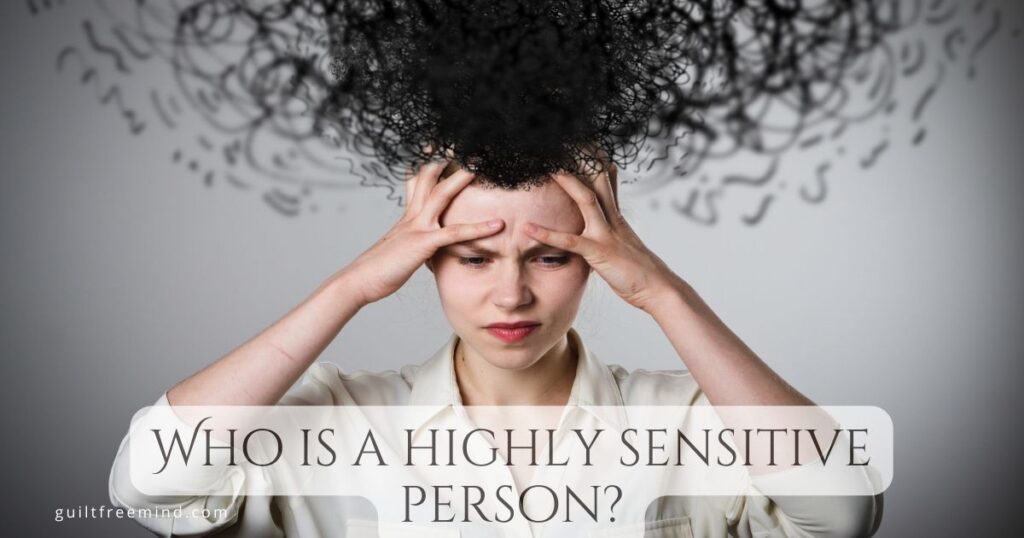
Traits of a highly sensitive person
As I mentioned before, a highly sensitive person possesses a finely tuned and unique nervous system. This allows such people to be more responsive and perceptive towards the environmental stimuli. Heightened sensitivity can manifest itself in many ways. Here are some of the characteristics that are common in a highly sensitive person:
Sensory sensitivity
A highly sensitive person is extremely sensitive towards environmental stimuli. They tend to notice subtle things that others would not bother with. This can include a strong sensitivity towards strong odors, bright lights, texture of clothing, and finally, loud noises.
Emotionally sensitive
A highly sensitive person experiences emotions much more deeply than others. They are empathetic towards others and easily pick up on what others are feeling. This can cause them to be emotionally overwhelmed in case things become difficult.
Empathy
A highly sensitive person is highly empathetic towards others. This makes them amazing caregivers and listeners. They intrinsically get attuned to the needs of others and try to offer support.
Overstimulation
Excessive information from the environment can cause a highly sensitive person to feel overwhelmed and overstimulated. Strobe lights, large crowds, noises, or even intense social interactions can cause such individuals to feel tired or overwhelmed.
Pin this article for later:
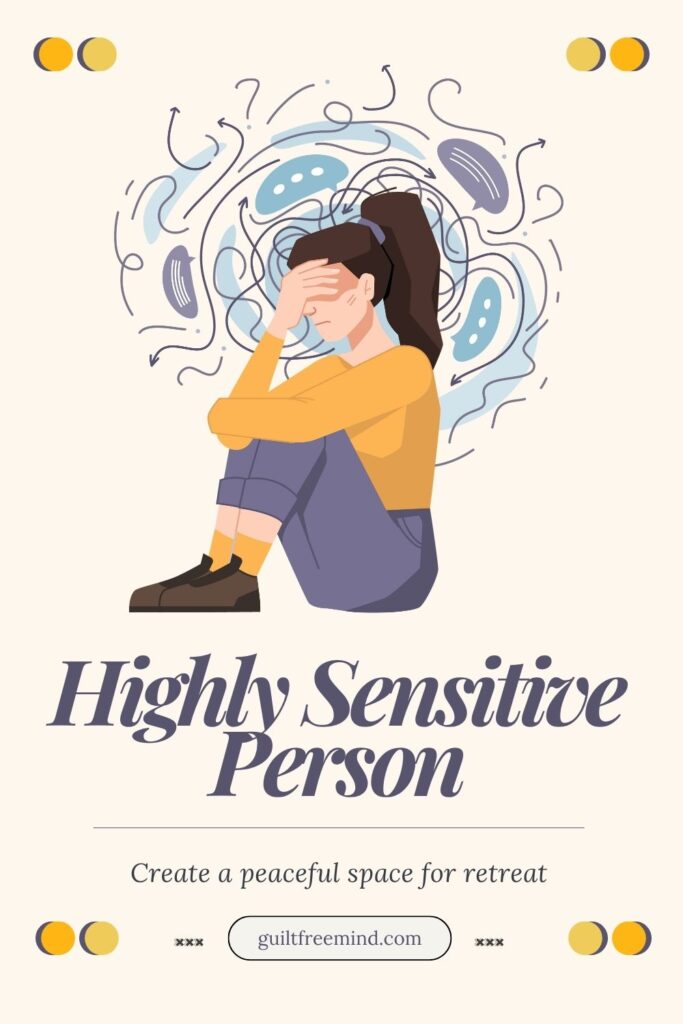
Introversion
Not every highly sensitive person needs to be an introvert. However, they do find solace in solitude and a quiet environment. Such people like to be alone when they need to recharge their sensory or social experiences.
Detail oriented
Those who are highly sensitive are extremely detail-oriented. They are also very thorough and planned in their work and decision-making methods. Their ability to be insightful allows them to easily connect information that may seem unrelated.

Creativity
Most highly sensitive individuals have a strong artistic impression. The day-to-day life can become overwhelming for such individuals. Thus, they use creative expression to release the overwhelming energy stored in them.
Intuition:
Those with highly sensitive traits have a strong gut instinct, sensing subtle shifts in environments. HSPs often feel changes like a friend’s mood shift or room tension, guiding decisions but needing balance to avoid overthinking.
Deep Processing
Such people tend to reflect extensively on experiences, leading to rich insights. They replay events for deeper meaning. This can lead to overthinking, enhancing problem-solving, though this can cause mental fatigue if not managed.
Physical Sensitivity
Those with highly sensitive traits react strongly to physical stimuli like temperature or pain. They may feel discomfort from cold rooms, rooms with very high temperatures, or scratchy clothes, requiring adjustments to stay comfortable.
Rich Inner Life
Such people have a tendency to maintain a vivid imagination and emotional depth. They dream up stories or feel emotions intensely. This inspires a lot of creativity but they also need outlets to avoid isolation.
Need for Downtime
Since such people feel more than others, they require regular breaks to avoid sensory overload. They step away from noisy settings to recharge, ensuring well-being in a fast-paced world.
Common misconceptions about a highly sensitive person
There are several misconceptions that a highly sensitive person is subjected to in this era (Eating Recovery Center). This has led to several misunderstandings when trying to understand such people. Here are some of the myths and the realities associated with them:
A highly sensitive person is weak
The primary misconception regarding a highly sensitive person is that they are considered to be weak. However, the reality is that such individuals have remarkably high emotional strength and resilience. Every day, they face external stimuli that are overwhelming for them. This requires high levels of internal strength and coping abilities.
A highly sensitive person is overly emotional
Even though a highly sensitive person experiences emotions much more intensely than others, this does not mean that they are gullible or extremely emotional. It is this high emotional response that allows them to have high creativity, empathy, and capability to understand others.
A Highly sensitive person is an introvert
Again, it does not necessarily mean that every highly sensitive person will also be an introvert. Some of the highly sensitive people are also introverts who love social interactions. However, such people will need a bit of alone time to recharge and deal with their emotions.
Those who are highly sensitive person are fragile
People think that those who are highly sensitive are also fragile and cannot handle the reality of life. However, such individuals are extremely resilient. Despite being susceptible to sensory overloads. they are expert at forming strategies that would allow them to easily manage such situations.
They are extremely shy.
Shyness and sensitivity are two different things altogether. Shyness is more often a result of social anxiety. However, sensitivity is a much broader trait that encompasses heightened awareness of emotional and sensory stimuli.
Such people should toughen up
Highly sensitive people are pretty strong as it is. Asking them to ‘toughen up’ is unhelpful. Asking them to not let the environmental stimuli affect them is also wrong. They don’t have control over what they feel and how they feel. All they can do is learn to manage the effects.
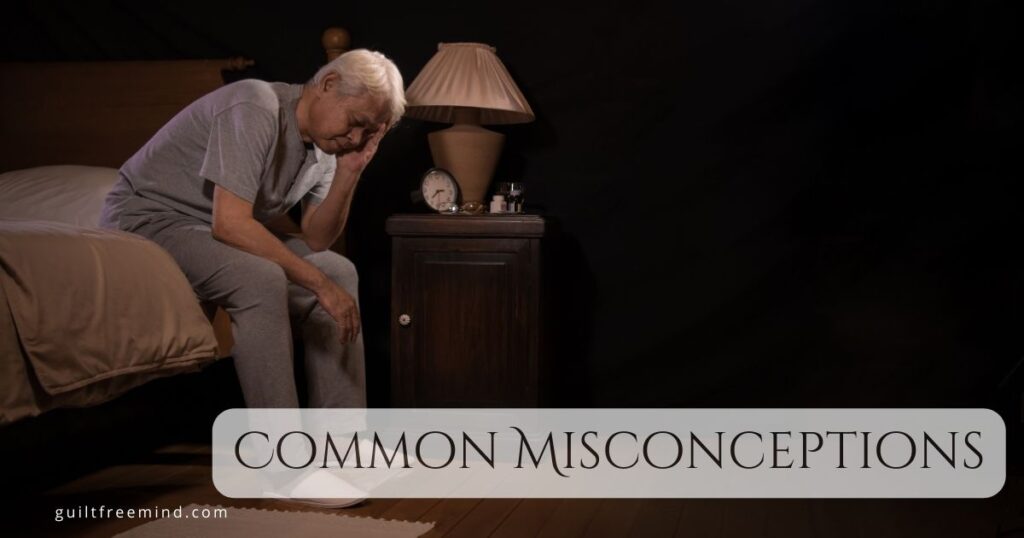
Highly sensitive person are high-maintenance
Due to the environment causing such people to feel overwhelmed, chances are they may try to avoid certain conditions and environments. This has nothing to do with being high-maintenance or picky. They are just trying to manage their life the best they can.
Developing coping strategies for a highly sensitive person
The only way you can handle the high level of emotions you experience is by developing useful coping strategies that can be employed when things become too much to handle. Some of the coping strategies that I will discuss in this article are developing self-awareness, setting boundaries, self-care, practicing mindfulness, stress management, resilience development, and finally, a support system.
Coping strategy 1: Developing self-awareness
If you are a highly sensitive person, you need to develop a better self-awareness. This will allow you to gain a better understanding of your sensitivity, understand the triggers, and acknowledge sensory and emotional responses.
- Gain knowledge about high sensitivity. Go through online resources, articles, books, etc. to better understand your traits and understanding the implications.
- Reflect on your experience. When do you feel overwhelmed? What caused it? When do you feel best and in sync with your external environment? These patterns can allow you to better understand your sensitivities.
- Keep a journal to easily record your reactions, emotions, thoughts, and triggers. This will allow you to better understand your stressors and environmental triggers.
- Engage in mindful activities like meditation to stay better attuned to your emotions and thoughts. Mindfulness allows you to detach yourself from the heightened emotions and feelings and have better clarity.
- Ask yourself why you reacted a certain way, what did you feel at that time? Introspective processes allow you to understand yourself better.
- Have an honest communication with those who love you. They can enlighten you about the facts you may have missed.
- Love and embrace yourself for who you are. You are an amazing and beautiful person who deserves every amazing thing life has to offer.

Coping strategy 2: Set boundaries
To protect your own sensory and emotional well-being, boundaries are a crucial part of a highly sensitive person. Your limits are crucial for your well-being. Here are some amazing tips for setting boundaries:
- Identify your stressors and triggers. Recognize when you are reaching your limits and need a break.
- Communicate your boundaries to loved ones. Be assertive and explain to them why you need time alone and how important it is for you. Eg:- “I am sensitive to loud noises, please keep the volume low. I’d appreciate it.”
- Learn to say no when needed. You can say NO without feeling guilty. Do not overcommit.
- When you set your boundaries, use “I” statements. Eg:-“I feel overwhelmed when there is a huge crowd.”
- Make sure you have a quiet place in the house where you can retreat when overwhelmed. This can be your sanctuary for recharge.
- Have a technology off time. When you are practicing self-care, keep notifications off and limit screen time.
- Limit your exposure to overly or negatively stimulating content on social media. These can trigger anxiety.
- Ask your friends and family for support.
Coping strategy 3: Self-care
Self-care is crucial, not only for a highly sensitive person but for normal people as well. Self-care helps you nurture your emotional, physical, and mental well-being. Here is how you can add self-care to your routine:
- Make sure you are getting enough rest and sleep. HSPs need more downtime to handle their emotional and sensory stimulation.
- Pay attention to your diet. Focus on a balanced diet and proper hydration. Minimize sugar and caffeine if it makes you jittery. (HSP Journey)
- Focus on exercise. It can help boost mood and reduce stress. Focus on routines that work for you like yoga and walks.
- As I mentioned before, meditation and mindfulness are key to health care.
- Make your living space tranquil and soothing.
- use noise-cancelling devices in case you live in a noisy space.
- Engage in creative outlets like sculpting and other artistic activities like painting, drawing, writing, or playing a musical instrument.
- Spend time in nature to rejuvenate your senses and soothe them.
- Recognize your limits and keep yourself from overcommitting on anything that can be overly taxing on you.
- If, self-care is not helping, go to a therapist. You deserve all the help you can get.

Coping strategy 4: Building a functional support system
A support system can be a huge help for a highly sensitive person trying to navigate their emotions. It helps them deal with their sensitivity and receive empathy from others. Here’s how you can maintain a supportive network of people:
- Identify those who are empathetic and understand your sensitivities. They are more likely to be supportive when things get difficult.
- Share information about highly sensitive people with those close to you. This will allow them to better understand the challenges you face regularly.
- Be honest and open about your feelings when you talk to them. Explain to them how they can help when you start to feel overwhelmed.
- Explain your boundaries and triggers. Tell them which behavior can be challenging to you and how to help you manage it
- Seek out groups that harbor others who think and feel like you. There you can connect with others like you. Sharing your experiences with those who understand can be very rewarding.
- Explore articles, podcasts, and other online resources that allow you to better understand high sensitivity.
- Schedule regular check-ins with your support group people. Keep them updated about your well-being and share your concerns.
- Provide support to your loved ones during their difficult times. Relationships and support systems are like a two-way street. They take care of you and vice versa.
Coping strategy 5: Emotional regulation
Emotional regulation is crucial if you are a highly sensitive person. This will help you manage the intense emotions you feel as a result of your heightened sensitivity. Here are some emotional regulation strategies :
- Start labeling your emotions. Labeling and acknowledging your emotions is the first step.
- Start journaling regularly to keep track of your emotions. Identify what triggers them. This will help you gain insight and identify the bigger picture.
- Use progressive muscle relaxation to systematically contract and relax the muscles of your body. This will help you release the stress that may have built up in your muscles.
- Challenge your irrational and negative thoughts. Question their validity and focus on balanced outcomes.
- Be patient with yourself. Treat yourself with kindness and understanding.
- Emotional regulation is a long-term process. Even if there are setbacks, pull yourself up and keep going.
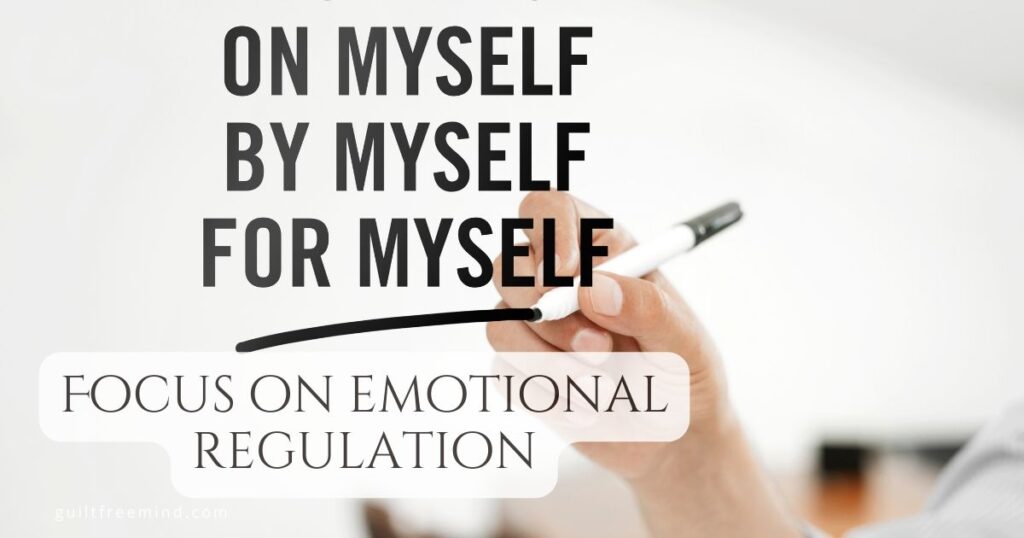
Coping strategy 6: Stress management
The heightened sensitivity causes a highly sensitive person to feel more stress. Thus, you must start by recognizing the stressors and triggers. (Verywell Mind)
- Organize your schedule, so you know which task to be done and when. This will prevent decision stress.
- Explore stress management techniques like deep breathing, guided imagery, meditation, or progressive muscle relaxation.
Some of the other things that contribute to stress reduction but have been discussed already in this blog post are:
- Regular exercise
- proper diet
- enough sleep
- meditation
- social support
- journaling
- Seek professional help.
Coping strategy 7: Building resilience
Resilience building is mandatory if you are a highly sensitive person and the world does not align with your sensitivities. Resilience will allow you to bounce back from difficult times, adapt better to adverse situations, and become stronger with every curveball life throws at you. Here are some strategies for developing resilience:
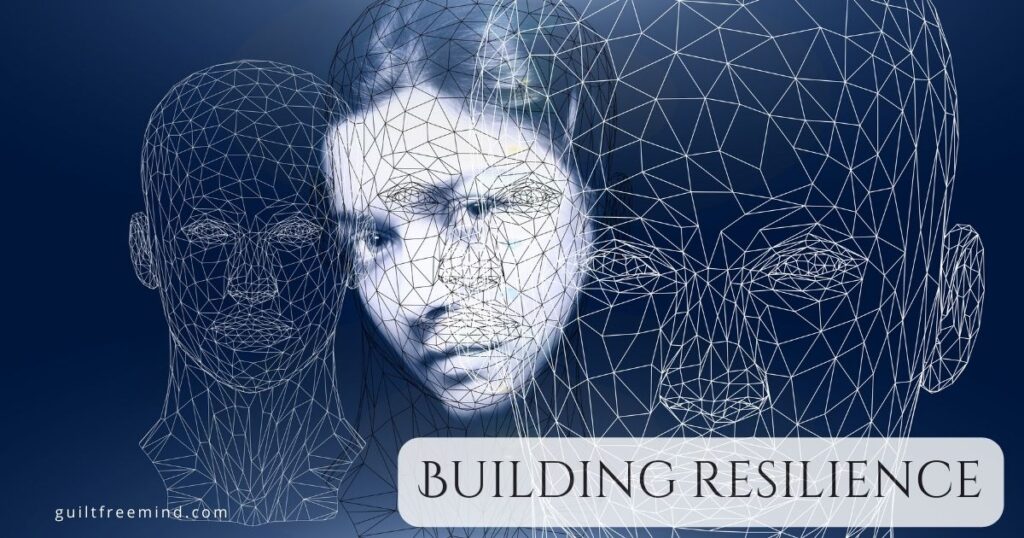
- Look at difficulties as opportunities for growth and learning. Recognize setbacks as part of your journey.
- Be kind to yourself. Remember, you are doing the best you can.
- Practice emotional regulation to keep your emotions in check and to be able to handle difficult feelings.
- Work on developing problem-solving skills so you can address problems head-on. Break down difficult problems into smaller chunks and tackle them one by one.
- Lean on and reach out to people in your social support group. Don’t hesitate to ask for help when needed.
- Cultivate nurturing relationships that fill you with a sense of belonging and understanding.
- Focus on self-care, especially when times get hard. Focus on healthy habits that boost your well-being: both physical and mental.
- Understand that change is constant. There is no point fighting change. You have to learn to go with it.
- Focus on long-term goals. Difficult situations are temporary and you should build inner strength to combat them.
- Maintain realistic goals. There is no point in focusing on a huge goal and then being disappointed when you don’t achieve it.
- Learn from difficult situations. Reflect on what you have learned and start applying them when needed.
- Build on your strengths like empathy, attention to detail, and creativity.
- Resilience is a gradual learning process. Be patient and understand that this will take time.
Coping strategy 8: Nature Therapy
Nature therapy offers a soothing escape for highly sensitive persons, helping to calm senses and uplift mood (Jerrica Danhoff Psychoptherapy). Spending time outdoors can restore balance and resilience. Here are some amazing tips for nature therapy:
- Take short walks in parks or green spaces to reduce sensory overload.
- Spend 10-15 minutes daily in nature to boost your mood and energy.
- Choose quiet outdoor spots to recharge, avoiding crowded areas.
- Practice deep breathing while surrounded by trees for added calm.
- Keep a nature journal to reflect on how it affects your well-being.
Coping strategy 9: Creative Outlets
Creative outlets provide a powerful way for highly sensitive persons to process emotions and ease overwhelm. Expressing yourself artistically can foster inner peace and strength. Here are some amazing tips for creative outlets:
- Try painting or drawing to release pent-up feelings creatively.
- Write in a journal or poetry to express deep emotions safely.
- Play a musical instrument to channel sensitivity into harmony.
- Set aside a quiet space for creative activities daily.
- Share your creations with a trusted friend for encouragement.
Coping strategy 10: Mindful Movement
Mindful movement, like gentle exercises, helps highly sensitive persons release tension and restore calm. These practices support both body and mind effectively. Here are some amazing tips for mindful movement:
- Reflect on how your body feels after each session for awareness.
- Practice tai chi for 5-10 minutes to ease physical stress.
- Do stretching exercises daily to relax tight muscles.
- Follow a guided yoga video to connect breath with movement.
- Move slowly to avoid overstimulation, focusing on sensation.
Expert Insights on Highly Sensitive Persons
- Dr. Elaine Aron, HSP Research Pioneer, says, “HSPs process sensory data more deeply, making them uniquely perceptive.”
- Dr. Sarah Johnson, Psychologist at Mental Health America, adds, “Mindfulness can empower HSPs to manage overwhelm effectively.”
Explore More on Guilt Free Mind
I’m not just here to teach you deep breathing for anxiety — I’m here to guide you toward a guilt-free, empowered mind with comprehensive mental wellness resources.
- ✔️ Mindful Productivity and Focus Hub: Enhance focus for a stress-free life
- ✔️ Stress Depression and Anxiety Hub: Learn proven techniques to reduce stress
- ✔️ Emotional Recovery and Resilience Hub: Build resilience for a balanced mind
- ✔️ Creative Healing and Therapy Hub: Deepen your knowledge of mental well-being
- ✔️ Self-Care and Wellness Hub: Nurture your mind with daily practices
- ✔️ Understanding Personality Disorders Hub: Nurture your mind with daily practices
These resources complement your journey of coping with high sensitivity, offering tools to foster mental clarity, resilience, and peace through Guilt Free Mind’s holistic approach.
Conclusion
This world conventionally sees resilience and toughness. If you are a highly sensitive person who wears your emotions on their sleeve, people will most likely consider you weak and gullible. However, what they don’t understand is that highly sensitive people also have an unmatched inner strength. Once they have mastered a few coping strategies, they will be a force to reckon with.
I’d love to hear your experiences! Have you tried these strategies as a highly sensitive person? Share your story in the comments below—your insights could inspire others on their journey. You can also make relaxation music your self-care superpower. 🌿 You deserve a guilt-free mind, and I’m here to help. Subscribe to my blog for weekly mental health insights, and join my YouTube channel, Guilt Free Mind, for curated playlists and self-care videos. Start your calm journey with these strategies today—your peace awaits! ✨

If you have any queries about this article or any other on Guilt Free Mind, please put them in the comment section. I will be happy to resolve your queries.
See you in my next blog post
Dr. Shruti.
Frequently asked questions
A highly sensitive person is an individual with a supercharged nervous system. This makes them more susceptible to external stimuli and emotional experiences. They can notice subtle things in their environment that others may miss.
HSP is not a mental health condition. It is a temperament or personality trait that occurs in a percentage of the population. However, those with HSPs are highly susceptible to emotional challenges and stress. It may arise due to past trauma.
HSP is not a mental health condition. It is a temperament or personality trait that occurs in a percentage of the population. However, those with HSPs are highly susceptible to emotional challenges and stress. It may arise due to past trauma.
Some of the common traits of a highly sensitive person are high emotional intensity, sensory sensitivity, introversion, deep information processing, and a tendency to get easily overwhelmed by situations.
Those who are HSP often have unique strengths like creativity, attention to detail, heightened empathy, and the ability to perceive subtle changes in their environment.
HSPs manage sensory overload by setting boundaries and practicing mindfulness and relaxation techniques. They should avoid stimuli and have a strict self-care routine.
They cannot change their sensitivity levels since it is a fundamental part of who they are. However, they can learn different coping strategies that they can use to better manage their sensitivity.
About the Author
Hi, I’m Dr. Shruti Bhattacharya, a Ph.D. in Immunology, mental health advocate, and the sole creator behind Guilt Free Mind. My doctoral research explored how stress-related immune proteins like Tenascin C and MRP8/14 influence chronic spinal conditions such as spondyloarthropathy—research that deepened my understanding of how the body’s stress response affects overall well-being. I now use this scientific insight to craft practical, evidence-based mental health content focused on emotional healing, resilience, and self-care. Every article is personally researched, written, and reviewed by me to maintain accuracy and compassion. Guilt Free Mind follows strict self-imposed editorial standards, and your privacy is protected under our SSL-secured policy.
References
- Eating Recovery Center. The Highly Sensitive Person (HSP): 8 Ways to Protect Your Mental Health
- HSP Journey. 4 Self-Care Ideas for the Highly Sensitive Person.
- Verywell Mind. How to Cope With Stress As an HSP.
- Jerrica Danhoff Psychoptherapy. 6 Life-Changing Self-Care Tips For Highly Sensitive People.

